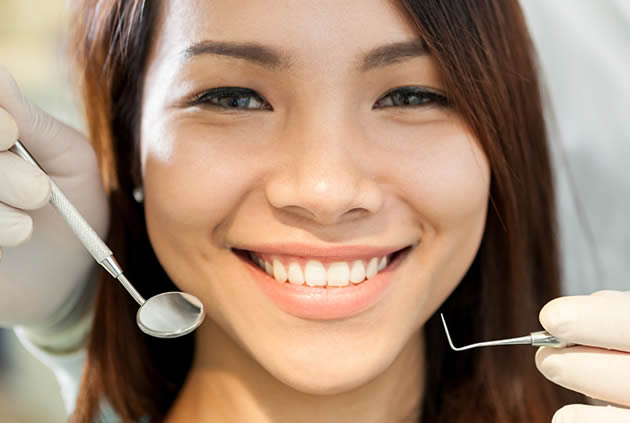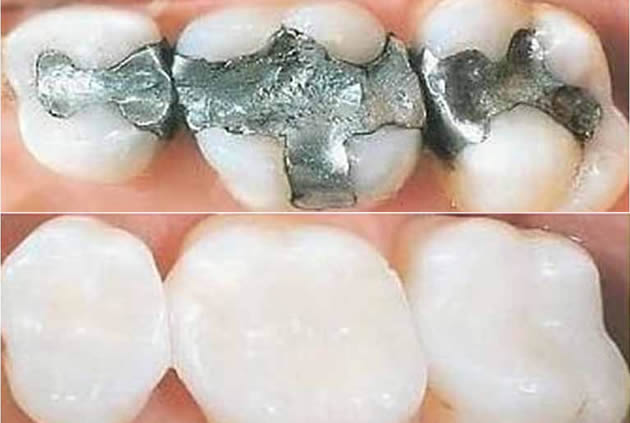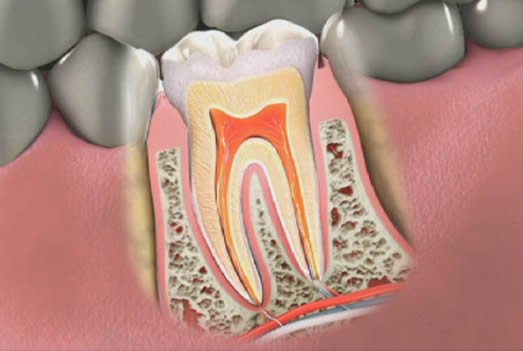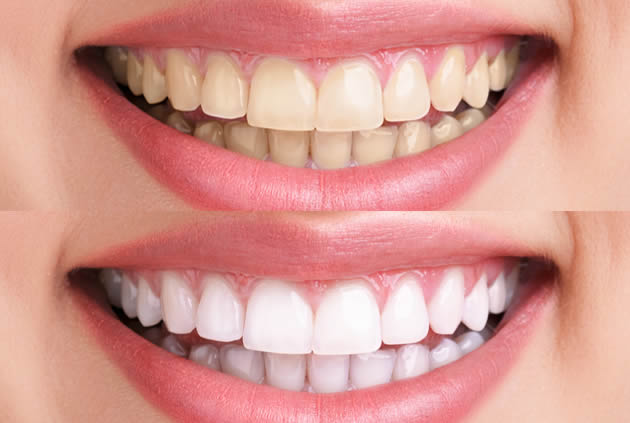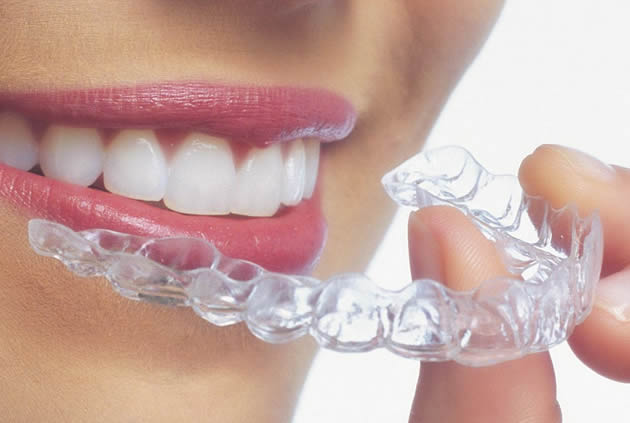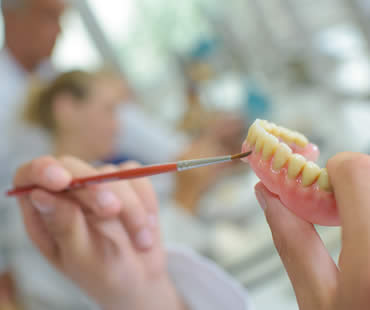
Thanks to advances in dental technology, dentures are more natural looking and comfortable than ever before. If you are one of the many adults wearing dentures to replace missing teeth, there are several do’s and don’ts you will want to follow to ensure they maintain their fit and your oral health:
- Do take your dentures out before going to bed, allowing your mouth tissues to rest from wearing them all day.
- Don’t let your dentures dry out. Soak them in mild denture solution or water while you sleep.
- Do clean them daily with either a mild detergent or special denture cleaning solution and a soft-bristled brush.
- Don’t soak them in very hot water, as this could cause them to warp, and they will no longer fit properly.
- Do handle them with care. Dropping your dentures or treating them with strong cleansers or harsh brushes can do permanent damage.
- Don’t neglect your oral care for the rest of your mouth. Even patients with a full set of dentures need to take care of their gums, and if you have partial dentures you should continue to brush and floss your remaining teeth regularly.
- Do pay attention to changes in the fit or feel of your dentures. Problems with fit can lead to irritation and discomfort, and could also be an indication of gum disease.
- Don’t try to adjust or repair your dentures on your own. If your dentures are ill-fitting or damaged in any way, schedule an appointment with your dentist to have them evaluated.
- Do continue to see your dentist for regular checkups to help maintain your best oral health and check your dentures for fit and function.
If you are missing all or some of your teeth, dentures can greatly improve both your appearance and the quality of your life. By following these simple guidelines, you can maintain the beauty and functionality of your dentures for many years.
If you need a dentist in Baltimore contact us today
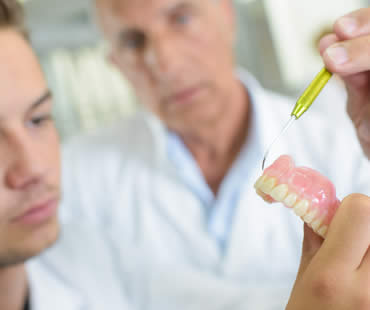
An implant overdenture combines the use of traditional dentures and implant technology to create a denture that fits over your remaining natural tooth roots or dental implants. These root or implant supported dentures are held in place by dental attachments which provide excellent stability and support for your dentures. Overdentures were developed to help patients missing some or all of their teeth regain a quality of life that may have been lacking since they lost their teeth.
There are several benefits to implant overdentures when compared to traditional dentures:
- Saving your natural roots or having implants placed slows bone loss by stimulating the bone in your jaw when you eat or chew.
- Because overdentures are better fitting by design, they are more stable and allow you to chew food more thoroughly. This promotes better digestion and allows you to absorb more nutrients.
- The increased stability provided by overdentures also means you are able to speak more clearly, as there is no slipping or clicking of your dentures.
- Loose dentures are not a worry with overdentures. Sticky adhesives and messy denture creams are unnecessary when you have implant overdentures.
- With overdentures, the natural shrinkage that occurs from an under-stimulated jaw does not occur. This keeps your face from looking sunken, as can often happen with traditional dentures.
To find out if you are a candidate for implant overdentures, schedule an evaluation by your dental professional. Overdentures could be the best, most natural treatment for restoring your oral health and beautiful smile.
We look forward to seeing you in our Baltimore dental office

An estimated 50 million Americans have lost all their teeth, and 69 percent of adults are missing at least one tooth. Without a full set of teeth, you may deal with alignment problems, dietary restrictions, and self-esteem issues. With modern dentures, your dentist can renew your appearance and improve oral health.
Dentures are prosthetic appliances created to replace missing teeth. Full dentures are rows of false teeth that cover the upper, lower, or both arches. If you still have some of your natural teeth, your dentist may suggest a partial denture, which fits into the empty space in your smile like a puzzle piece.
How do dentures feel?
At first, your prosthesis may take some getting used to, so give your mouth time to adjust. You may have some difficulty with pronunciation, but that will pass.
Will my dentures need to be replaced?
As we age, our mouth tissues change. Over time, your dentures may need to be repositioned, realigned, or entirely remade. Never make changes to your appliance; contact your dentist if something doesn’t seem right.
How do I care for my dentures?
To protect your dental appliance, handle the denture with care. When you take the device out, always store it safely in its case. Gently clean your dentures with mild soap and water to remove bacteria. Make sure to put the denture out of reach from small children or pets.
Do I still need to brush if I have dentures?
Absolutely. Your gums still need proper oral care, so brush them twice daily to keep the tissue healthy.
We offer dentures at our Baltimore dental office

If you are currently a denture wearer, you know that dentures can be problematic when it comes to eating a wide variety of foods, especially those foods with a very crunchy or chewy texture. Dentures can click or move when you are eating, or food debris can collect underneath, leading to poor fit and irritation of the soft palate and gums. Over time, if your dentures aren’t properly cleaned, this can lead to an odor in the dentures that causes bad breath for the wearer.
Issues with stability and retention of standard dentures mean that many wearers have food restrictions, including healthful and fresh foods they previously enjoyed with their healthy natural teeth. Some of the most nutritious foods available are problematic for denture wearers, making chewing difficult. Because so much of the digestion process begins in the mouth with the mastication of food, poorly chewed food can cause digestion difficulties and eventually be a factor in overall poor health.
Standard dentures can also affect the enjoyment of eating the foods that are allowed. They can be bulky, especially on the roof of the mouth, taking away a large part of savoring the texture and flavor of foods.
Hybrid dentures address all of these issues. They are crafted so that the roof of the mouth remains completely open and uncovered. Texture and flavor are enhanced over typical dentures. Hybrid dentures are affixed firmly with four or more dental implants functioning as anchors. These denture anchors are extremely secure and stable, giving the wearer the confidence to eat, drink, and speak.
Talk to your dentist today to see if hybrid dentures can improve your life. Experience the positive effects of hybrid dentures as your put your best smile forward with confidence that it looks and functions virtually identically to your natural teeth and gums.
Schedule your appointment at our Baltimore dental office
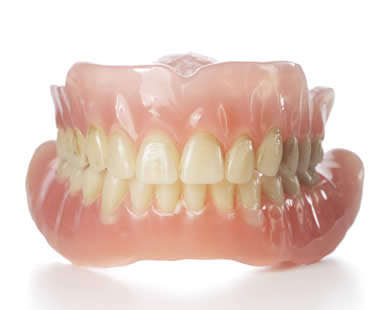
Have you lost all or most of your teeth due to damage, disease or decay and don’t find traditional removable dentures an attractive option? Implant-supported hybrid dentures are an alternative to traditional dentures that provide a secure and stable prosthetic replacement for missing teeth by combining the benefits of a fixed replacement with the advantages of a removable denture. Hybrid dentures are an especially viable option for patients who have lost a large amount of jawbone due to missing teeth. Some of the benefits of hybrid dentures include:
- Hybrid dentures save your natural roots and preserves bone while reducing bone resorption and deterioration.
- Hybrid dentures help to control facial contour changes caused by missing teeth.
- Hybrid dentures function more naturally, allowing you to chew food better and speak more clearly.
- With hybrid dentures, there is no need for messy denture creams and adhesives, eliminating much of the embarrassment associated with loose dentures.
- Hybrid dentures eliminate the slippage, clacking and loss of taste associated with traditional dentures.
If you would like fixed teeth to replace teeth that you have lost but are not ready or a candidate for multiple individual implants for each missing tooth, hybrid dentures could be your solution. Hybrid dentures require only a few dental implants to secure the new teeth in place, allowing for quicker recovery time and increased comfort.
If you are seeking an alternative to traditional dentures to replace your missing teeth, talk with your dental professional to determine if you are a good candidate for hybrid dentures. With hybrid dentures, you can successfully restore the look, feel, and function of your natural teeth.
We look forward to seeing you in our Baltimore dental office

If you’ve been wearing dentures for a while, you may have some complaints. They might fit poorly and shift or click when you talk or eat. Poor fit can lead to discomfort and sores in the mouth that worsen over time, or they can collect food underneath them, leading to bad breath.
If this sounds familiar to you, there might be alternatives for you. One of the newest developments in dentures is the pairing of standard dentures with dental implants. The dental implants are placed directly into your jawbone, providing the kind of stability only previously offered by natural teeth. Dentures fixed in the mouth with dental implants become something new: hybrid dentures.
Dentures that utilize dental implants as their anchors are very stable. They enable denture wearers to enjoy foods previously denied them, such as crisp, healthy foods or chewy cuts of meat. Eliminating the food restrictions present for many denture wearers allows them to eat a wider variety of foods, helping to reduce the risk of poor nutrition and the poor health associated with it, including digestion difficulties.
Because of this increased stability, the denture itself can be made smaller. A standard denture covers the roof of the mouth completely, inhibiting the taste and texture of foods. A denture designed around dental implants, however, has an open roof and facilitates a greater enjoyment of foods of all kinds, as well as a more natural feel for your tongue.
Dental implants also stimulate bone by mimicking natural tooth roots. This stimulation allows the bone to continue to be strong and alive, whereas the bones of the face can begin to shrink once a tooth has been extracted. This bone shrinkage leads directly to poor denture fit. Dental implants used with dentures avoid this issue.
If you are a denture wearer and you’d like to see some changes in how your dentures fit, talk to your dentist to see how using dental implants can improve your denture experience.
Schedule your appointment at our Baltimore dental office












